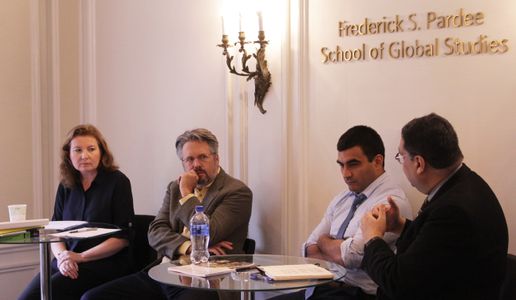BtH: Cryptocurrencies and Blockchain
The Beyond the Headlines @BUPardeeSchool, or BtH, series at the Frederick S. Pardee School of Global Studies at Boston University continued on October 3, 2018 with a panel discussion exploring the intricacies of cryptocurrencies and blockchain. The discussion was co-sponsored with the Boston University Mongolian Students and Scholars Association.
The panel, entitled “Cryptocurrencies and Blockchain: What Should We Worry About,” featured Georgi Panterov, Researcher at the World Bank Group, Pardee School Professor of International Political Economy Perry Mehrling, and Daivi Rodima-Taylor, Researcher at the BU African Studies Center. The discussion was moderated by Pardee School Dean Adil Najam.
Panterov outlined what fascinated him about cryptocurrencies and blockchain when the technology first started to emerge as distrust in traditional financial institutions grew following the 2007 financial crisis.
“To me it was just a fascinating technology, and if you’re just a little bit mathematically inclined you can appreciate that the way it was designed was very elegant. The fact that it works is amazing,” Panterov said. “The second thing that I think is absolutely amazing is that it has value — it’s nonzero, it has positive value. It’s very much the antithesis of fiat money. There is no such thing with Bitcoin. It grew from basically nothing and the fact that has value is amazing.”
Rodima-Taylor, who co-wrote a recent book chapter on cryptocurrencies with Pardee School Associate Dean William Grimes, discussed the limitations and potentials of blockchain use in the developing world, emphasizing that many of the current applications of blockchain – in the areas such as migrant remittances, land registries, national systems for identity verification – increasingly intersect with and are determined by existing institutional and socio-historic environments.
Mehrling said that the absence of credit — and the value placed on trust that goes along with the concept of credit — is the most striking difference to him between traditional money systems and cryptocurrencies.
“Cryptocurrency and blockchain are a symptom — interest in those things is a symptom — of the state of play in society right now,” Mehrling said. “What I learned today is that interest is more acute in places that are institutionally weak. I’ve been concerned that it’s not in fact a solution, and that for the people who are running down that road it’s going to end in tears. I worry about that from a policy point of view.”
Panterov discussed the advantages of cryptocurrencies and blockchain technologies for individuals in countries with weak institutions and higher levels of corruption.
“These technologies help address issues that we in the U.S. and Western Europe don’t have, but if you are in a country that has poor institutions there may be very important applications,” Panterov said. “The fact that you can enter into an agreement and don’t have to rely on the government or the judicial system that you may not trust to enforce it.”
Beyond the Headlines is a regular series at the Frederick S. Pardee School of Global Studies which seeks to cultivate informed conversations among experts and practitioners on issues that are currently in the news headlines, but to do so with a focus on intellectual analysis and on longer-range trends. Recent Beyond the Headlines discussions have focused on topics including the Rohingya crisis in Myanmar, politics of development research and transnationalism and health in Asia.
